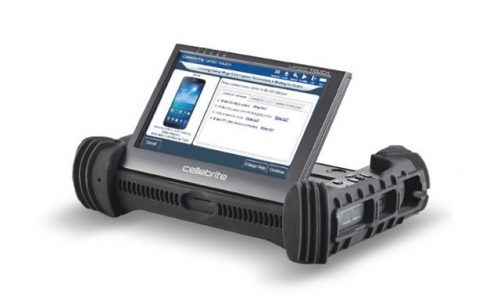
Earlier this year, Davis passed new regulations on surveillance technology, which require the police department to submit a report on the consent calendar 30 days prior to asking the city council to hold a public hearing to continue using surveillance equipment.
The police submitted reports on seven surveillance technologies: Cellebrite, Personal Recording, GeoTime, GPS, Remote Cameras, Surveillance Tech Trail Cameras, and Surveillance Tech City Cameras.
Cellebrite “advertises its ability to unlock devices running iOS 11, including the iPhone X, to government agencies.” An article from February noted, “Cellebrite, the Israeli security firm believed to have helped the FBI unlock an iPhone during the San Bernardino investigation, is claiming it is capable of bypassing the security of devices running iOS 11 and older versions, including recently launched hardware including the iPhone 8 and iPhone X.”
A report source claims “the Department of Homeland Security successfully raided an iPhone X in a search for data in November 2017, most likely by using Cellebrite’s technology. A separate source  involved in the police forensics community claims he was informed by Cellebrite it could unlock an iPhone 8, and believed it would also be true of the iPhone X.”
involved in the police forensics community claims he was informed by Cellebrite it could unlock an iPhone 8, and believed it would also be true of the iPhone X.”
In their surveillance impact report, the Davis Police write: “The CUFED [Cellebrite Universal Forensic Extraction Device] is a forensic tool used to extract data from mobile phones, smartphones, and personal digital assistants (PDAs). The device itself is not surveillance technology. It simply extracts data from a device. However, because personal data is extracted the use of the device raises constitutional privacy concerns that have been addressed by the United States Supreme Court (use requires search warrant, consent or exigent circumstances).”
The police note: “The CUFED is used at the police department. Personal technology devices such as smart phones are commonly used to commit crime and are commonly carried by those who commit crimes. These devices contain significant investigative data.”
The report notes that extraction requires “search warrant, written owner consent or exigent circumstances.”
The police adds: “The devices are commonly used by law enforcement agencies around the world. As with any other forensic device, extracted data must be carefully safeguarded to avoid releasing private information.”
Remote cameras are portable cameras that are remotely accessed by the police. Each camera contains its own digital video recorder which records the data and can be accessed by an external hard drive or other source.
The police write: “Cameras can be attached to fixed objects such as buildings, traffic standards or light poles, or placed in parked automobiles or other stationary places.”
They note: “Remote Cameras are used to monitor areas where crime has been reported, to surveille individuals who are suspected of committing crime and to monitor crowd size and dynamics at city events in order to better deploy resources.”
They are “commonly deployed on buildings, traffic standards, light poles, in parked cars and other fixed objects.”
The police add: “An assessment identifying any potential impact on civil liberties and civil rights and discussing any plans to safeguard the rights of the public; Remote Surveillance Camera Systems are used by law enforcement to monitor locations where crime is suspected of occurring, monitoring crowds during public events so as to better deploy resources, and surveilling individuals who are suspected of being involved in crime. Remote Surveillance Cameras are placed in locations that are open to the public.”
The police note that video images gathered by the cameras are for official use of the police department. “Requests for recorded video images from the public or the media shall be processed in the same manner as requests for department public records. Members of the public do not have access to this information when it is gathered as part of a criminal investigation.”
—David M. Greenwald reporting







New and increasing numbers of personal electronic devices capture transmit and store potentially incriminating information. You walk around with an active cell phone not aware that you’re carrying a transponder. Your every move can be actively monitored, or captured later.
In the vast majority of instances, this ability could prevent innocent citizens from being a criminal suspect only because they had the means, motive, and opportunity. Their phone, however, says they were not at the crime scene, preventing the stigma of being a suspect or “person of interest.” Privacy rights proponents should take note that benefits both individuals and society.
Current application of search and seizure law arose from decades of statute and case law protection of homes, vehicles, and telephonic communications. They have served US society well, creating an understood and acceptable balance between the inherent conflict between individual rights and society’s right to protect its collective self.
As is intimated in this brief summation, a local populist policy can mimic existing standards of privacy protections.
I’m more than a little surprised that drones are never mentioned.
According to the Chief, we do not have drones – nor have they disclosed their presence.
I would point out that this is all a disclosure document, not a regulatory one, though under the ordinance, council does have the ability to reject new surveillance technology.